Mitsubishi Space Star vs VW Caddy – Differences & prices compared
Compare performance, boot space, consumption and price in one view.
Find out now: which car is the better choice for you – Mitsubishi Space Star or VW Caddy?
The Mitsubishi Space Star (Hatchback) comes with a Petrol engine and Manuel or Automatic transmission. In comparison, the VW Caddy (High Roof Estate) features a Petrol, Diesel or Plugin Hybrid engine with Manuel or Automatic transmission.
When it comes to boot capacity, the Mitsubishi Space Star offers 235 L, while the VW Caddy provides – depending on how much space you need. If you’re looking for more power, decide whether the 71 HP of the Mitsubishi Space Star or the 150 HP of the VW Caddy suits your needs better.
In terms of consumption, the values are 4.90 L per 100 km for the Mitsubishi Space Star, and 0.50 L for the VW Caddy.
Price-wise, the Mitsubishi Space Star starts at 11600 £, while the VW Caddy is available from 27800 £. Compare all the details and find out which model fits your lifestyle best!
Mitsubishi Space Star
The Mitsubishi Space Star offers a compact yet surprisingly spacious experience, making it an ideal choice for urban dwellers who need agility and comfort. Its sleek design is complemented by a range of vibrant colour options, adding a touch of flair to everyday commutes. With a focus on efficiency and practicality, the Space Star combines a user-friendly interface with modern technology to ensure a smooth driving experience.
details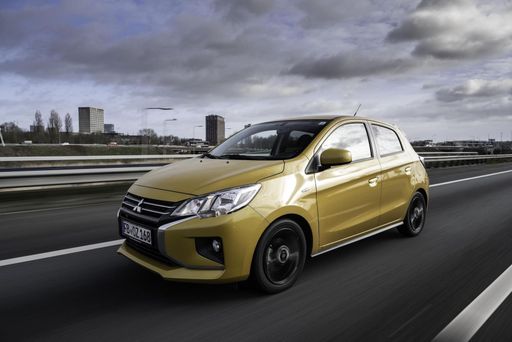 @ presse.mitsubishi-motors.de
@ presse.mitsubishi-motors.de
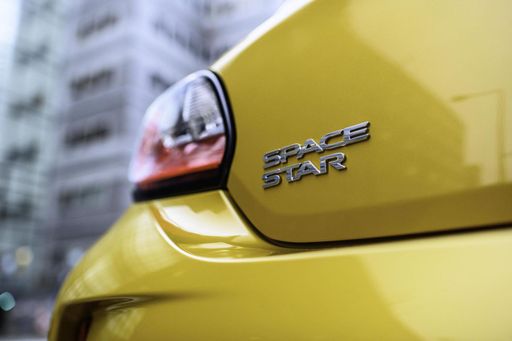 @ presse.mitsubishi-motors.de
@ presse.mitsubishi-motors.de
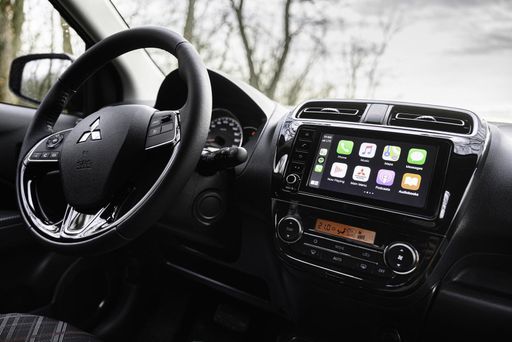 @ presse.mitsubishi-motors.de
@ presse.mitsubishi-motors.de
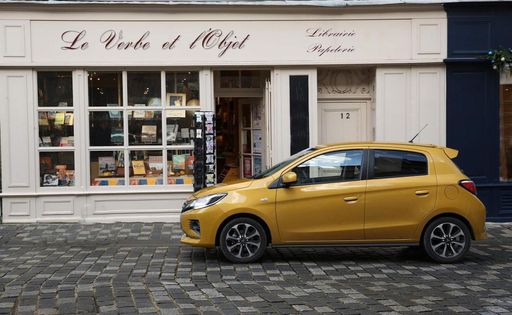 @ presse.mitsubishi-motors.de
@ presse.mitsubishi-motors.de
VW Caddy
The VW Nutzfahrzeuge Caddy Hochdach-Kombi is a versatile choice for those seeking extra space and practicality in their everyday vehicle. With its functional high roof and adaptable interior, it easily accommodates both passengers and cargo. The Caddy also stands out with its modern design and features aimed at providing comfort and convenience on the road.
details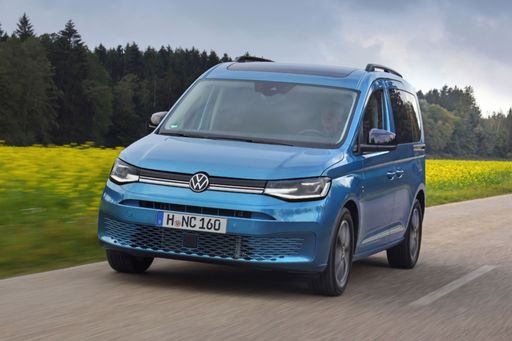 @ vwpress
@ vwpress
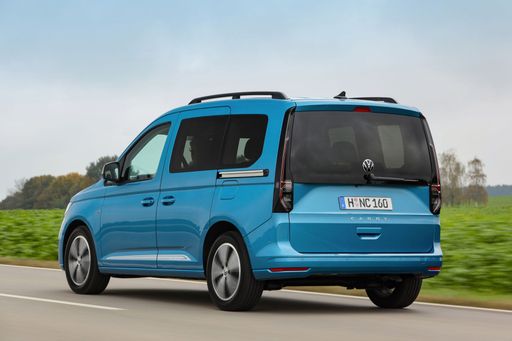 @ vwpress
@ vwpress
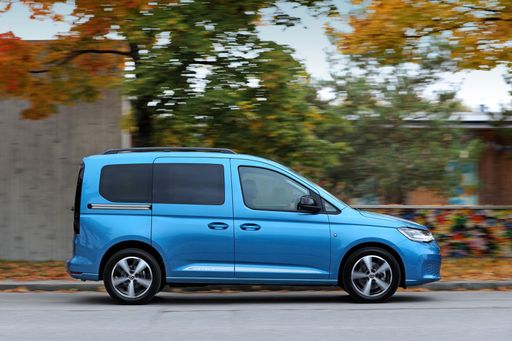 @ vwpress
@ vwpress
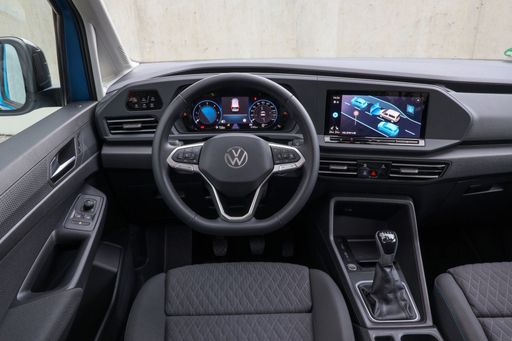 @ vwpress
@ vwpress

|

|
|
|
|
Costs and Consumption |
|
|---|---|
|
Price
11600 - 18700 £
|
Price
27800 - 45900 £
|
|
Consumption L/100km
4.9 - 5.5 L
|
Consumption L/100km
0.5 - 6.9 L
|
|
Consumption kWh/100km
-
|
Consumption kWh/100km
-
|
|
Electric Range
-
|
Electric Range
116 - 121 km
|
|
Battery Capacity
-
|
Battery Capacity
19.70 kWh
|
|
co2
112 - 125 g/km
|
co2
10 - 165 g/km
|
|
Fuel tank capacity
35 L
|
Fuel tank capacity
50 L
|
Dimensions and Body |
|
|---|---|
|
Body Type
Hatchback
|
Body Type
High Roof Estate
|
|
Seats
5
|
Seats
5 - 7
|
|
Doors
5
|
Doors
5
|
|
Curb weight
940 - 1009 kg
|
Curb weight
1575 - 1998 kg
|
|
Trunk capacity
209 - 235 L
|
Trunk capacity
-
|
|
Length
3845 mm
|
Length
4500 - 4853 mm
|
|
Width
1665 mm
|
Width
1855 mm
|
|
Height
1505 mm
|
Height
1819 - 1860 mm
|
|
Payload
360 - 400 kg
|
Payload
501 - 710 kg
|
Engine and Performance |
|
|---|---|
|
Engine Type
Petrol
|
Engine Type
Petrol, Diesel, Plugin Hybrid
|
|
Transmission
Manuel, Automatic
|
Transmission
Manuel, Automatic
|
|
Transmission Detail
Manual Gearbox
|
Transmission Detail
Manual Gearbox, Dual-Clutch Automatic
|
|
Drive Type
Front-Wheel Drive
|
Drive Type
Front-Wheel Drive, All-Wheel Drive
|
|
Power HP
71 HP
|
Power HP
102 - 150 HP
|
|
Acceleration 0-100km/h
14.1 - 15.8 s
|
Acceleration 0-100km/h
11.4 - 14 s
|
|
Max Speed
163 - 167 km/h
|
Max Speed
173 - 186 km/h
|
|
Torque
102 Nm
|
Torque
220 - 320 Nm
|
|
Number of Cylinders
3
|
Number of Cylinders
4
|
|
Power kW
52 kW
|
Power kW
75 - 110 kW
|
|
Engine capacity
1193 cm3
|
Engine capacity
1498 - 1968 cm3
|
General |
|
|---|---|
|
Model Year
2020 - 2023
|
Model Year
2024
|
|
CO2 Efficiency Class
C, D
|
CO2 Efficiency Class
E, F, B
|
|
Brand
Mitsubishi
|
Brand
VW
|
Mitsubishi Space Star
Introducing the Mitsubishi Space Star: A Perfect Blend of Efficiency and Innovation
The Mitsubishi Space Star continues to impress urban drivers with its compact yet efficient design. Celebrated for its practicality and fuel economy, this hatchback offers a unique blend of new-age technology and reliable performance. Let’s dive into some of the technical details and innovations that make the Space Star a popular choice among compact car enthusiasts.
Engine and Performance
The Space Star is powered by a 1.2-litre, 3-cylinder petrol engine, delivering a respectable 71 PS (52 kW). The engine provides a harmonious balance of power and efficiency, reaching a top speed of up to 167 km/h. With a torque of 102 Nm, drivers can expect smooth city rides and decent highway cruising capabilities. The Space Star's economy ranges from 4.9 to 5.5 litres per 100 kilometres, ensuring that your journeys remain budget-friendly and environmentally considerate.
Transmission and Driving Dynamics
When it comes to the driving experience, buyers have the option of a 5-speed manual transmission or a CVT automatic. This flexibility allows for a more personalised driving experience, whether you prefer the engagement of manual shifting or the convenience of an automatic gearbox. The car's front-wheel-drive setup further enhances its maneuverability, making it an ideal companion for navigating tight city streets.
Design and Dimensions
The Mitsubishi Space Star is designed to turn heads with its sleek, aerodynamic lines while maintaining a practical size. Measuring 3845 mm in length, 1665 mm in width, and 1505 mm in height, it's a perfect fit for urban driving. Despite its compact form, the Space Star offers five seats and five doors, providing ample accessibility and comfort for both the driver and passengers.
Interior Features and Comfort
Inside, the Space Star prioritises comfort and convenience with thoughtfully designed interiors. The luggage space ranges from 209 to 235 litres, ideal for shopping trips or weekend getaways. The vehicle comes in a variety of trim levels, including Basis, Plus, Select, and Top, with each offering distinct features to meet different customer needs. Whether you need basic amenities or more premium touches, the Space Star has a version that will suit your lifestyle.
Safety and Environmental Impact
Safety innovation is a hallmark of the Mitsubishi Space Star, ensuring peace of mind for drivers and passengers alike. Its CO2 efficiency class ranges from C to D, with emissions between 112 to 125 g/km, reflecting its dedication to reducing the environmental footprint. These features contribute to making the Space Star a responsible choice for the eco-conscious driver.
Cost of Ownership
Affordability is another attractive aspect of the Space Star. Prices range from €13,590 to €21,790, making it accessible for a wide array of budgets. Running costs are equally competitive, with monthly expenses estimated between €627 and €767, and cost per kilometre ranging from 25.1 to 30.7 cents, all contributing to a car that is as economical to own as it is to drive.
Conclusion
In summary, the Mitsubishi Space Star offers a compelling package of efficiency, practicality, and modern technology. Its combination of fuel economy, flexible transmission options, and affordability make it a standout choice in the compact car segment. For those looking for a reliable and economical city car, the Space Star remains a strong contender that shouldn't be overlooked.
VW Caddy
A Versatile Classic Reimagined: The Volkswagen Caddy
The Volkswagen Caddy has long been celebrated as a versatile workhorse, adeptly bridging the gap between utility and comfort. With its roots tracing back to the 1980s, the Caddy has evolved considerably, transforming from a humble commercial vehicle to a sophisticated multi-purpose van. The latest model continues this tradition by offering innovative features and enhanced technical specifications, reaffirming its status as an indispensable vehicle for both professional and personal use.
Efficient Engines and Environmental Innovation
At the heart of the Volkswagen Caddy lies an array of engines designed to balance performance with efficiency. The latest generation offers a selection of TSI petrol and TDI diesel engines, each engineered to meet the strictest environmental standards. These Euro 6 compliant engines not only reduce emissions but also ensure optimal fuel efficiency, making the Caddy an economically viable choice for businesses and environmentally conscious drivers alike.
For those seeking an even greener option, Volkswagen offers a natural gas engine variant. This innovative powertrain reduces CO2 emissions significantly, yet delivers a driving experience that remains characteristically smooth and powerful. This commitment to alternative energy sources reflects Volkswagen's dedication to sustainability and forward-thinking automotive design.
Advanced Connectivity and Safety Features
The Volkswagen Caddy is not just about robust performance; it also shines in the realm of technology and safety. The modern dashboard is equipped with the Discover Media navigation system, integrating satellite navigation with real-time traffic updates. This intuitive infotainment system gets wirelessly connected to smartphones via Apple CarPlay and Android Auto, keeping drivers informed and entertained during every journey.
Safety is paramount in the latest Caddy, which comes standard with a suite of advanced driver assistance systems. Front Assist with City Emergency Braking ensures crucial safety in urban environments, while Adaptive Cruise Control with speed limiter provides comfort and control on the open road. Additionally, features like the Park Assist system make maneuvering in tight spaces a breeze, offering peace of mind and ease of use no matter the driving conditions.
Dynamic Design and Practicality
Blending aesthetics with functionality, the redesigned exterior of the Volkswagen Caddy is both modern and practical. It features a streamlined silhouette that not only improves aerodynamic efficiency but also enhances its visual appeal. From the distinctive front grille to the LED headlamps, every design element serves a purpose, resonating Volkswagen’s design philosophy of form following function.
Inside, the Caddy offers a remarkably spacious interior, adaptable to a variety of needs. Depending on the configuration, it accommodates up to seven passengers comfortably or can be transformed to offer substantial cargo space, catering to professionals who require versatility from their vehicles. The interior details are thoughtfully crafted, with high-quality materials that sustain durability and comfort over long-term use.
Conclusion: A Modern Mainstay
The Volkswagen Caddy, with its latest iteration, continues to embody versatility and innovation. Its efficient powertrains, cutting-edge connectivity features, and commitment to safety set new standards in the compact van segment. Whether utilized as a family vehicle or a business asset, the Caddy remains a formidable choice, carrying forward a legacy of reliability and ingenuity.
For drivers seeking a well-rounded vehicle that offers the best of both worlds—commercial reliability with personal comfort—the Volkswagen Caddy stands as an exemplary choice. It is not just a vehicle; it's a partner on wheels, designed for the multifaceted demands of modern life.
The prices and data displayed are estimates based on German list prices and may vary by country. This information is not legally binding.
